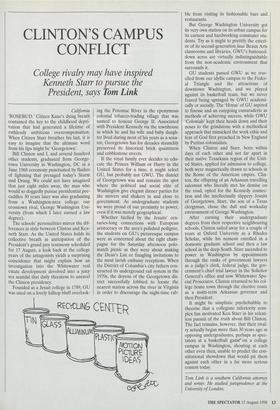CLINTON'S CAMPUS CONFLICT
College rivalry may have inspired Kenneth Starr to pursue the
President, says Tom Link Califomia `ROSEBUD.' Citizen Kane's dying breath contained the key to the childhood depri- vation that had generated a lifetime of ruthlessly ambitious overcompensation. When Citizen Starr breathes his last, it is easy to imagine that the ultimate word from his lips might be 'Georgetown'.
Bill Clinton and I, and several hundred other students, graduated from George- town University in Washington, DC in a June 1968 ceremony punctuated by flashes of lightning that presaged today's Sturm and Drang. We could not have imagined that just eight miles away, the man who would so doggedly pursue presidential pec- cadillos 30 years later was also graduating from a Washington-area college: our crosstown rival, George Washington Uni- versity (from which I later earned a law degree).
The schools' personalities mirror the dif- ferences in style between Clinton and Ken- neth Starr. As the United States holds its collective breath in anticipation of the President's grand jury testimony scheduled for 17 August, a look back at the college years of the antagonists yields a surprising coincidence that might explain how an investigation into the Whitewater real estate development devolved into a juicy sex scandal that daily threatens to unravel the Clinton presidency.
Founded as a Jesuit college in 1789, GU was sited on a lovely hilltop bluff overlook- ing the Potomac River in the eponymous colonial tobacco-trading village that was named to honour George II. Associated with President Kennedy via the townhouse in which he and his wife and baby daugh- ter lived during most of his years as a sena- tor, Georgetown has for decades staunchly preserved its historical brick quaintness and cobblestone streets.
If the royal family ever decides to edu- cate the Princes William or Harry in the United States for a time, it might select GU, but probably not GWU. The district of Georgetown was and remains the spot where the political and social elite of Washington give elegant dinner parties for the movers and shakers in and close to government. As undergraduate students we were proud of our proximity to power, even if it was merely geographical.
Whether fuelled by the Jesuits' cen- turies-long connections with European aristocracy or the area's polished pedigree, the students on GU's picturesque campus were as concerned about the right cham- pagne for the Saturday afternoon polo- match picnic as they were about making the Dean's List or finagling invitations to the most lavish embassy receptions. When the District of Columbia's city fathers con- structed its underground rail system in the 1970s, the doyens of the Georgetown dis- trict successfully lobbied to locate the nearest station across the river in Virginia in order to discourage the night-time rab- ble from visiting its fashionable bars and restaurants.
But George Washington University got its very own station on its urban campus for its earnest and hardworking commuter stu- dents. Try as it might to prettify the exteri- or of its second-generation faux Beaux Arts classrooms and libraries, GWU's buttoned- down acres are virtually indistinguishable from the non-academic environment that surrounds it.
GU students passed GWU as we trav- elled from our idyllic campus to the Feder- al Triangle and the attractions of downtown Washington, and we played against its basketball team, but we never feared being upstaged by GWU academi- cally or socially. The `Hoyas' of GU aspired to finesse and an easygoing camaraderie as methods of achieving success, while GWU `Colonials' kept their heads down and their noses to the grindstone with a methodical approach that mimicked the work ethic and fear of God first preached in New England by Puritan colonialists.
When Clinton and Starr, born within days of each other and not far apart in their native Texarkana region of the Unit- ed States, applied for admission to college, both were magnetically drawn to schools in the Rome of the American empire. Clin- ton, the offspring of an Arkansan travelling salesman who literally met his demise on the road, opted for the Kennedy connec- tion and the intellectually slippery Jesuits of Georgetown. Starr, the son of a Texas clergyman, chose the dull and workaday environment of George Washington.
After earning their undergraduate degrees from their respective neighbouring schools, Clinton sailed away for a couple of years at Oxford University as a Rhodes Scholar, while his nemesis enrolled in a domestic graduate school and then a law school in the deep South. Starr ascended to power in Washington by appointments through the ranks of government lawyers as a judge's clerk, federal judge, the gov- ernment's chief trial lawyer in the Solicitor General's office and now Whitewater Spe- cial Prosecutor. Clinton returned to his col- lege home town through the elective route as a multi-term Arkansas governor and then President.
It might be simplistic psychobabble to theorise that a collegiate inferiority com- plex has motivated Ken Starr in his relent- less pursuit of the truth about Bill Clinton. The fact remains, however, that their rival- ry actually began more than 30 years ago as opposing undergraduates, perhaps as spec- tators at a basketball game' on a college campus in Washington, shouting at each other even then, unable to predict the con- stitutional showdown that would pit them against each other in a far more serious contest today.
Tom Link is a southern California attorney and writer. He studied jurisprudence at the University of London.


























































 Previous page
Previous page